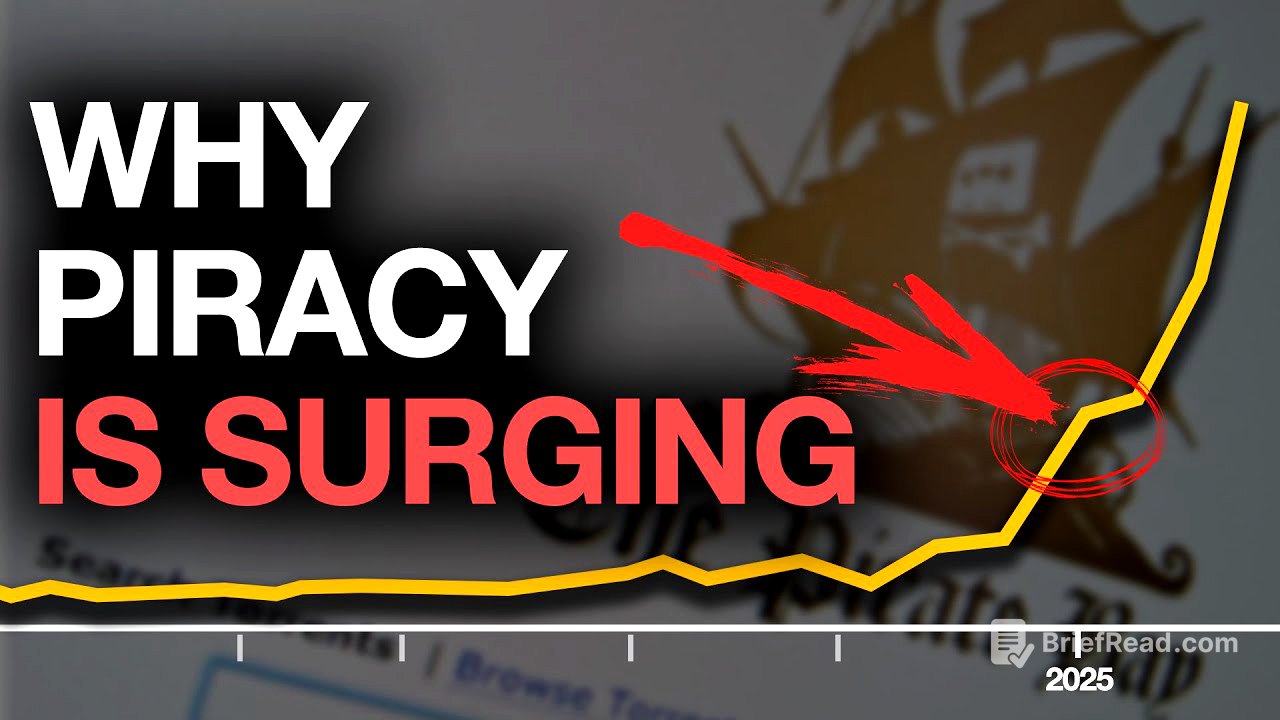TLDR;
This video discusses the resurgence of piracy across various media, including sports, movies, TV shows, manga, and scientific research. It explains that while piracy was declining with the advent of convenient and affordable streaming services like Netflix and Spotify, the landscape has shifted due to content fragmentation, rising subscription costs, and restrictive practices by media companies. The video highlights that piracy is often driven by a lack of accessible and affordable legal options, with pirate services sometimes offering better service and access than official channels.
- Piracy is on the rise due to fragmented content and expensive legal options.
- People are willing to pay for content if it's accessible and affordable.
- Pirate services often provide better customer service than legal alternatives.
Introduction: The Resurgence of Piracy [0:00]
The video begins by highlighting the increasing rates of illegal sports streaming in the UK, exemplified by fans openly chanting about using Amazon Fire Sticks to pirate matches. This issue extends beyond sports, with a significant portion of Gen Z admitting to pirating movies and TV shows. Despite decades of efforts to combat piracy, it has seen an unexpected resurgence, particularly since the pandemic. This trend is not limited to media, as the scientific research community also widely engages in pirating papers and research.
The Rise and Fall of Streaming Services [2:08]
In the early 2000s, pirating content was difficult and riddled with issues like pop-ups and viruses. The emergence of legal alternatives like Netflix and Spotify was revolutionary because they offered convenient, affordable access to a wide range of content. However, as more companies entered the streaming market, they began to compete on intellectual property rather than usability or convenience. This led to content being siloed across multiple platforms, forcing consumers to subscribe to numerous services and effectively recreating the problems of cable TV.
The Manga Example: When Piracy Fills a Void [5:38]
Manga is one of the most pirated pieces of content in the world, particularly among Americans. This is largely due to the lack of timely and accessible legal options. As Gabe Newell, the CEO of Valve, stated, piracy is often a service problem. In the case of manga, it can take years for official translations to become available, leading fans to create their own translations to fill the void. This demonstrates that people are willing to pay for content if it is delivered in a timely and accessible manner.
Service Problems and the Spread of Piracy [8:10]
The video uses the example of British football to illustrate how service problems drive piracy. Many prime-time football matches are not shown on TV to encourage attendance, but the high cost of tickets makes it unaffordable for many fans. This has led to the use of pirated streams via devices like Fire Sticks. This dynamic extends to scientific research, where paywalls restrict access to important information. The Sci-Hub website, which provides access to pirated scientific content, receives over half a million visitors daily, highlighting the demand for accessible research.
The Failure of Legal Services and the Rise of Pirate Alternatives [10:15]
Legal services seem to have forgotten the lesson that a comprehensive, affordable service is always going to win. While legitimate options for accessing various forms of media have been getting worse, pirate options have been focusing on improving customer service, quality, price, and accessibility. Instead of trying to genuinely improve their services, companies have relied on intellectual property rights to force subscriptions. This strategy is failing as consumers increasingly vote with their wallets and turn to pirate alternatives that offer a better overall experience.









